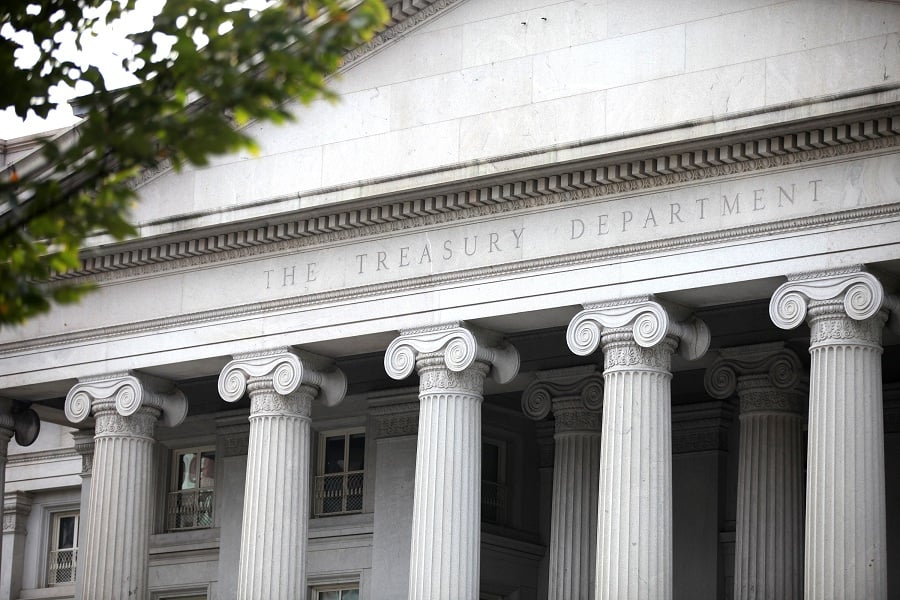

Investment advisors are keeping their faith in U.S. Treasury securities despite rising political tension over the federal debt because Treasuries remain one of the safest places to invest client funds even with the looming risk of a government default.
President Biden and House Speaker Kevin McCarthy, R-Calif., are scheduled to meet Tuesday to begin discussions about raising the $31.4 trillion debt limit. The country could run out of money to pay bills it’s already incurred as early as June 1, according to the Treasury Department.
But Democrats and Republicans remain far apart on raising the debt ceiling. Biden insists on a clean bill to increase the limit, while Republicans are adamant that deep spending cuts accompany a debt ceiling boost. The GOP-majority House narrowly approved a bill that outlines Republican demands. The measure has no chance in the Democratic-controlled Senate.
The potential collateral damage of a default would center on Treasuries. But that isn’t causing advisors to shy away from them, even as they adjust investment strategies in anticipation of volatile markets as the country reaches the debt precipice.
Judith Lu, founder and CEO of Blue Zone Wealth Advisors, has been de-risking portfolios.
“We have been defensive for quite some time,” Lu said. “If you’re overweight in equities, it would be a good time to start pulling that back, if you’re afraid of a default.”
Treasuries remain a safe haven.
“It’s sort of like the nicest house on an ugly block, which, relatively speaking, is the best place to be,” Lu said. “If there was ever a time when there’s no place to hide in the market, it’s now.”
Politicians playing chicken with a default has become frequent occurrence over the last decade or so. Antwone Harris, chief planning strategist at Platinum Bridge Wealth Strategies, recalled when the U.S. credit rating was downgraded during the 2011 debt-ceiling standoff.
“It doesn’t take an actual default to throw the markets into turmoil,” Harris said. “I’m more concerned about the threat of a default than an actual default. An actual default would be untenable for the global economy.”
Harris is reducing exposure to small-cap stocks while increasing exposure to intermediate and short-term Treasuries through exchange-traded funds that hold them. That gives him the latitude to increase equities if the market rebounds after a debt-ceiling scare.
“I want the flexibility to get back in the markets relatively quickly,” he said.
Clients are beginning to express concerns about a potential default, and advisors are responding. Lisa A.K. Kirchenbauer, founder and president of Omega Wealth Management, sent a note to her clients on Friday.
“It definitely feels like there are a lot of unknowns right now, and I will do my best to be politically balanced in our assessment,” she began her note.
Kirchenbauer is trying to keep her clients calm. Now is not the time for radical alterations of investment strategy or attempts to game volatility to make up for 2022 losses.
“Making quick, more emotional moves right now does not serve an investor,” she said. “You need to stay the course.”
Retired clients may be in a different situation if they depend on Social Security to finance living expenses. Entitlement payments may be delayed if politicians can’t come to a timely agreement about the debt ceiling.
“Then you need to be thinking in terms of having bigger cash reserves,” Kirchenbauer said.
The debt ceiling standoff is only one of the current market threats. There’s also the regional banking crisis. In response to that, Kerrie Debbs, partner at Main Street Financial Solutions, has been moving clients out of money-market funds that aren't insured and into Treasuries.
That move requires some manual labor because Treasuries must be purchased individually for each client.
“It’s a lot of work,” Debbs said. “There’s nothing automatic about buying Treasuries.”
Although they may be preparing for a default, most advisors don’t think one is going to happen — or expect that if it does, it will be short-lived — because of the potential catastrophic consequences for the U.S. and global economies.
“If there is a default, I can’t image it will last very long,” Harris said. “The turmoil caused by a default will bring everybody to the table, and they’ll quickly figure something out.”
Lu has a similar faith politicians will act just before — or maybe just after — the clock strikes 12 on default.
“They cannot afford not to come to an agreement,” she said. “But I’m sure it will come at 11:59 and 59 milliseconds.”
The solution again will be to go into more debt, Debbs said.
“The question is how much money are they going to print,” Debbs said. “They’re not going to default.”

A Texas-based bank selects Raymond James for a $605 million program, while an OSJ with Osaic lures a storied institution in Ohio from LPL.

The Treasury Secretary's suggestion that Trump Savings Accounts could be used as a "backdoor" drew sharp criticisms from AARP and Democratic lawmakers.

Changes in legislation or additional laws historically have created opportunities for the alternative investment marketplace to expand.

Wealth managers highlight strategies for clients trying to retire before 65 without running out of money.

Shares of the online brokerage jumped as it reported a surge in trading, counting crypto transactions, though analysts remained largely unmoved.
Orion's Tom Wilson on delivering coordinated, high-touch service in a world where returns alone no longer set you apart.
Barely a decade old, registered index-linked annuities have quickly surged in popularity, thanks to their unique blend of protection and growth potential—an appealing option for investors looking to chart a steadier course through today's choppy market waters, says Myles Lambert, Brighthouse Financial.
